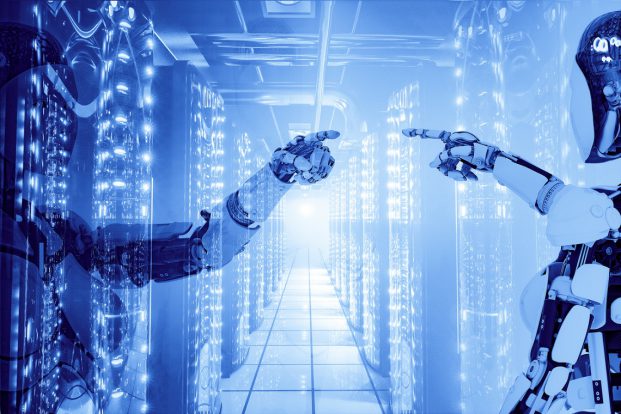Not just about, artificial intelligence is being used by retailers across the entire product supply chain and customer service cycle, writes Norrelle Goldring.
Copyright by www.theshout.com.au
 First coined in 1956, the concept of Artificial Intelligence (AI) has been the subject of a slew of sci-fi movies. But it’s only recently with the advent of data analytics and cloud computing that its applications beyond robots or Skynet, including for marketing, have become clear. According to Forbes, AI’s impact on marketing alone is predicted to reach nearly US$40 billion by 2025. An August 2018 Capgemini survey of 400 global retail executives indicated AI could save retailers as much as US$340 billion annually by 2022.
First coined in 1956, the concept of Artificial Intelligence (AI) has been the subject of a slew of sci-fi movies. But it’s only recently with the advent of data analytics and cloud computing that its applications beyond robots or Skynet, including for marketing, have become clear. According to Forbes, AI’s impact on marketing alone is predicted to reach nearly US$40 billion by 2025. An August 2018 Capgemini survey of 400 global retail executives indicated AI could save retailers as much as US$340 billion annually by 2022.
But what is AI and how does it differ from Big Data? How can it best be used in a retail context?
As outlined in my article in last month’s National Liquor News , Big Data refers to computational analysis of large datasets to reveal patterns, trends and associations. It can be used for predictive analytics, which makes assumptions and tests in order to predict future scenarios.
AI, and in particular machine learning, automates analysis. It makes assumptions, assesses models and re-evaluates data to provide detailed predictions at speed and scale, without human intervention. It learns from itself, with predictions therefore becoming increasingly accurate and more specific over time.
How can AI be used in a retail context?
A January 2019 IBM survey of 1,900 retail and consumer goods executives across 23 countries identified six main ways the industry plans to utilise AI:
- Supply chain planning (85 per cent)
- Demand forecasting (85 per cent)
- Customer intelligence (79 per cent)
- Marketing, advertising, and campaign management (75 per cent)
- Store operations (73 per cent)
- Pricing and promotion (73 per cent).
Key retail areas in which AI is being used include sales and CRM, customer recommendations, payments, manufacturing, logistics and delivery. Capgemini estimates that 80 per cent of the $340 million in savings would stem from more efficient processes for supply chains and returns.
Thank you for reading this post, don't forget to subscribe to our AI NAVIGATOR!
Marketing: AI predicts shopping habits based on patterns identified in an individual’s shopping behaviours. Rather than simply sending promotions for items a shopper has previously bought, retailers can offer related products and items based on data from both the individual and the broader customer set.
Pricing and Promotion: AI can determine the best price for individual items using data including seasonality, price elasticity customer product preferences and purchase histories, along with real-time inputs on inventory levels and competitive products and prices. This results in more specific discounts or marginal price increases on individual SKUs to increase demand and maximise profits.
Metcash’s ALM last year announced a partnership with AI provider Complexica for standardising and optimising its promotions by using its PCM capabilities to plan and analyse campaigns, along with predicting and optimising their effectiveness. […]
Read more – www.theshout.com.au


Not just about, artificial intelligence is being used by retailers across the entire product supply chain and customer service cycle, writes Norrelle Goldring.
Copyright by www.theshout.com.au
But what is AI and how does it differ from Big Data? How can it best be used in a retail context?
As outlined in my article in last month’s National Liquor News , Big Data refers to computational analysis of large datasets to reveal patterns, trends and associations. It can be used for predictive analytics, which makes assumptions and tests in order to predict future scenarios.
AI, and in particular machine learning, automates analysis. It makes assumptions, assesses models and re-evaluates data to provide detailed predictions at speed and scale, without human intervention. It learns from itself, with predictions therefore becoming increasingly accurate and more specific over time.
How can AI be used in a retail context?
A January 2019 IBM survey of 1,900 retail and consumer goods executives across 23 countries identified six main ways the industry plans to utilise AI:
Key retail areas in which AI is being used include sales and CRM, customer recommendations, payments, manufacturing, logistics and delivery. Capgemini estimates that 80 per cent of the $340 million in savings would stem from more efficient processes for supply chains and returns.
Thank you for reading this post, don't forget to subscribe to our AI NAVIGATOR!
Marketing: AI predicts shopping habits based on patterns identified in an individual’s shopping behaviours. Rather than simply sending promotions for items a shopper has previously bought, retailers can offer related products and items based on data from both the individual and the broader customer set.
Pricing and Promotion: AI can determine the best price for individual items using data including seasonality, price elasticity customer product preferences and purchase histories, along with real-time inputs on inventory levels and competitive products and prices. This results in more specific discounts or marginal price increases on individual SKUs to increase demand and maximise profits.
Metcash’s ALM last year announced a partnership with AI provider Complexica for standardising and optimising its promotions by using its PCM capabilities to plan and analyse campaigns, along with predicting and optimising their effectiveness. […]
Read more – www.theshout.com.au
Share this: